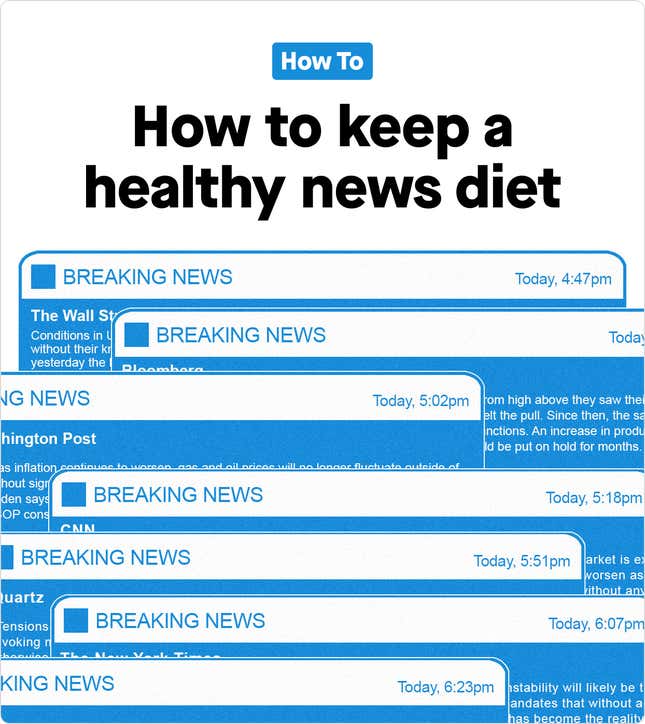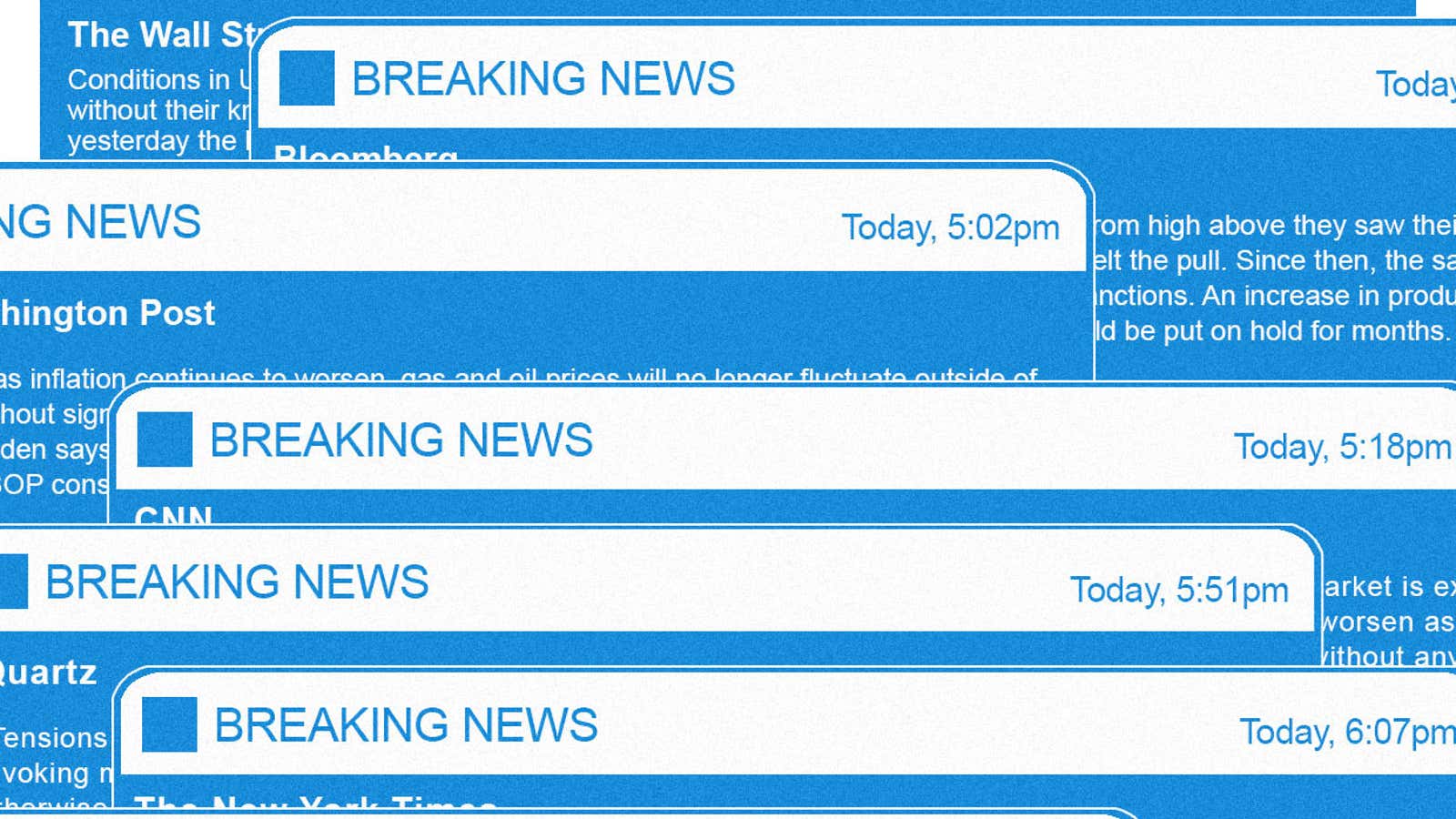
Hi Quartz members,
When there’s a major global news event, serious news organizations, less serious content providers, clout-chasers, and scammers all kick into gear.
We have seen this with the pandemic, and we’re seeing it again with Russia’s invasion of Ukraine—there are outlets offering detailed updates about the crisis, analysis, and even respite for those who need a mental break.
For anyone interested in knowing more about what’s happening in the world, a healthy news diet is essential. But with an ocean of information to drown in, it’s important to know what to consume, and what to avoid. That’s especially true in big news moments, but also on quieter days, when calm reflection and context are needed.
In general—and you know this well as a Quartz member—you usually get what you pay for.
Where to get your news
Start by deciding what interests you.
Just like exercise, it’s best to focus on the news you’ll actually read, rather than a distant, unrealistic aspiration. Don’t pretend to subscribe to Fine Arts Aficionado Monthly if you really want Soap Opera Digest, in other words. If you’re not sure if a particular subscription is right for you, take advantage of free trials and discounted offers. You might find that you’re a regular reader of just one or two, or prefer to float between several.
- Large news organizations like the BBC, CNN, or the New York Times cover most topics, and offer a broad overview of current events.
- There are also many specialist publications. The Athletic does sports, your city newspaper covers local issues, and so on.
- General-interest magazines like Esquire or Cosmopolitan also usually contain real journalism, alongside fashion, pop culture, vacations, and 476 perfume ads. You could legitimately read them for the articles.
Social media
If a healthy news habit is like drinking eight glasses of water a day, social media is like trying to sip from a fire hose (where probably not everything coming out is water).
Frankly, it’s not worth using social media unless your need for information is pathological. There is too little context and nuance, and the barrage of content is unhealthy. It’s really for fans of non sequiturs, conspiracies, and echo chambers. Professional journalists use it because it is fast and extensive, but they are trained to discriminate between what’s useful and what isn’t.
But you will do it anyway, we know, so here are a few things to bear in mind to avoid getting sucked too deeply into the vortex:
- Be judicious about whom you follow. Start off following only the main news accounts. Add individual journalists with discretion as you become familiar with their work and know it’s trustworthy.
- Read the articles. The headline is not enough.
- Comment and share with care. Try to be constructive and critically engaged, especially if you want to know more.
Bias in news
Bias exists because humans, even journalists, have points of view. It’s unavoidable.
Some outlets try hard to be objective and impartial, but a growing number have eschewed this somewhat artificial perspective and have leaned into their own viewpoints, courting readers who share them.
For you, this means either accepting and embracing bias that aligns with your values and beliefs, or seeking out more neutral sources.
It’s worth understanding the reliability of information is even from biased sources. Sites such as AllSides, Media Bias / Fact Check, and Pew Research offer ratings on publishers and individuals in media; Poynter has tips to help spot misinformation.
Either way, it is impossible to please everyone, especially in the social media age, with an army of armchair experts looking for the slightest deviation from their worldview. But individuals can attempt to be curious about other points of view, and checking out news from a different perspective can sometimes be refreshing.
Building the habit
Beyond the content, the medium is important. Will you watch TV, listen to the radio, put a podcast on, or read a newspaper? If your preferred format is reading digital news, is that on a tablet, your phone, or a laptop? It should fit into your life and routine, not the other way round.
- Whatever medium you use, be consistent. Traditionally, you might read a morning newspaper and watch the nightly news on TV. The rest of the day, you got on with your life. It’s more difficult to be disciplined with today’s modern devices, but it’s worth trying.
- Turn off notifications, or at least tailor them around your preferences, in terms of timing, location, or specific interests.
- Think about frequency. Do you want daily newspapers piling up? Or would a solid weekly or monthly schedule be better?
Have a great weekend,
—Hasit Shah, news editor (trawling through Twitter, for my sins)
One 🎧 thing
I am originally a radio journalist, and as such, I can confidently say that nothing beats high-quality radio news. Not podcasts, but live, seat-of-the-pants broadcasting from great reporters as news breaks, that you can listen to while you’re driving, or getting the kids’ breakfast ready, or walking the dog.
Thanks to digital platforms like Tune-In, you can choose from radio stations across the world, depending on what regions interest you. The BBC World Service is probably the most comprehensive, and broadcasts in 40 languages.
No other medium takes you so quickly to the scene of a news event, and allows you to hear what’s happening. Pictures are great, but sound is better.
